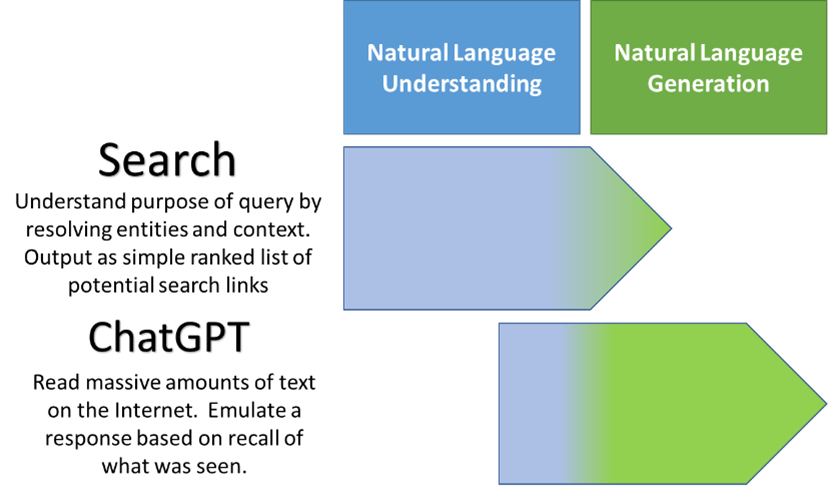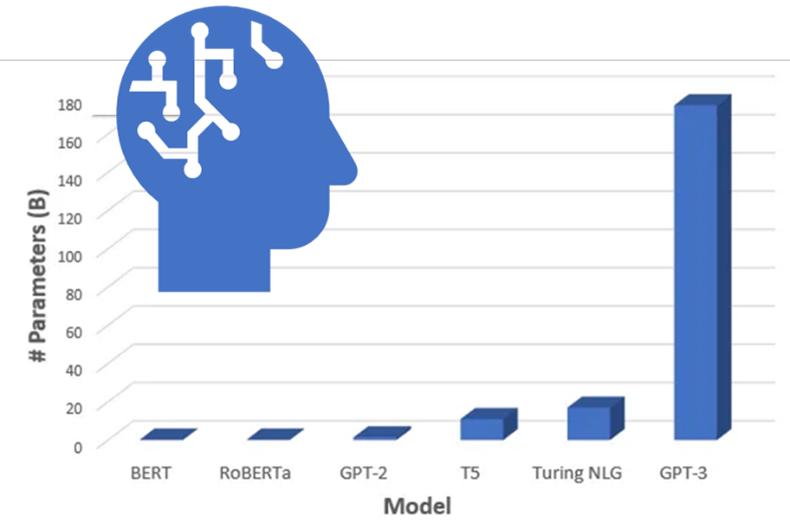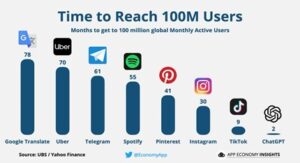By: Malcolm White, CFA and Jeremy Yeung, CFA
As AI applications begin to show near-human abilities, a battle is erupting between technology giants to show who will be the first to integrate these technologies into their existing infrastructure. The stakes are incredibly high as seen with the massive market capitalization moves seen as technology bellwethers Microsoft and Google show early concepts of their new search platforms.
We asked Malcolm White, BMO Global Innovators Fund’s Portfolio Manager, to provide his unique insights given that he has been studying AI for over six years now and has personally used many of these next-generation language tools for industry applications. He comments on the underlying innovations but more importantly why a myopic view of ChatGPT solely as a search technology misses the more important investment ramifications.
This is What We Were Talking About
We made some bold statements last October that 1) new generative AI applications were excellent 2) they were ready for commercialization and 3) and we believed that these AI-based applications can be the foundation of the next industrial revolution. We backed these claims up by showing amazing images generated by AI (just like the graphic under our introduction – Figure 1) and by highlighting medical applications using AlphaFold that can predict protein structures. But we lacked that knockout application that would cement our points.
Then came ChatGPT.
This AI application took the world by a storm and became our holiday gift. It not only validated our key theses but it also validated another that we would not see the lost decade of innovation that occurred post the dot.com crisis. This was because we spent the last ten years building incredible infrastructure to deploy technology: data centres, cloud computing, and 5G wireless networking infrastructure. If a technology was worthy of capturing the world’s attention – it would do so in record time. ChatGPT certainly did this by achieving the incredible milestone of reaching 100 million monthly active users in only 2 months (see Figure 2); the popular Instagram in comparison took over 2 years to achieve the same milestone1.
Figure 2 – Time Required for an Application to Reach 100 Million Global Users (in Months)

Source: UBS / Yahoo, as of February 22, 2023
What is ChatGPT? Just ask ChatGPT
If you aren’t part of the 100 million active monthly user base and have managed to avoid the onslaught of media coverage around ChatGPT and still wonder what ChatGPT is, we recommend asking ChatGPT itself, “What is ChatGPT?” The AI application would generate the following reply2:
ChatGPT is an open source chatbot created by OpenAI. It is a conversational AI system that uses a large-scale pre-trained language model to generate intelligent, human-like responses to user input. ChatGPT is based on the GPT-3 language model and is capable of generating human-like responses in multiple languages.
Can ChatGPT Get a Wharton MBA?
Now we can remember the days when AI was so bad it was comical – see aiweirdness.com – so we do have a healthy perspective on the subject. But these days we have to hold back our excitement on how good AI is. ChatGPT is good – too good. It is so good that universities are banning it, studying it, or both. A professor at Wharton discovered it could pass an MBA exam (achieving a B to B-) and others speculate it might be able to pass legal or other exams3. Wharton Professor Christian Terwiesch went on to further elaborate in his research paper4 that ChatGPT:
… has shown a remarkable ability to automate some of the skills of highly compensated knowledge workers in general and specifically the knowledge workers in the jobs held by MBA graduates … [and] has demonstrated the capability of performing professional tasks such as writing software code and preparing legal documents
But for those who think that humans no longer have to think again, he notes ChatGPT:
… makes surprising mistakes in relatively simple calculations at the level of 6th grade Math. These mistakes can be massive in magnitude
So human intelligence is in no danger of being replaced as feared. Instead, our thesis is that AI applications such as ChatGPT are incredible productivity tools that will benefit the humans that adopt it. We call this process Cognitive Automation and believe it will power the next industrial revolution.
War of the Words – The Tech Titans Have Awoken
Given that ChatGPT has been the fastest technological adoption curve ever recorded (Figure 2), it is no surprise that it has caught the attention of the technology titans. Just as we had knowledge of these incredible capabilities of these new Large Language Models (LLM) such as ChatGPT, they too knew that the day would come when the public became aware of these applications.
The bid for AI language supremacy, specifically ChatGPT, has become a vicious competition by technology bellwethers Microsoft and Google to see who can produce the most compelling vision of consumer-oriented products based on ChatGPT.
Google (Alphabet Inc.) responded to a rumoured Microsoft threat, that they would be the first to launch these tools, by revising its Search, Lens and Maps products. These products are enhanced by in-house AI products that understand language, images and music (Imagen, LaMDA, MusicLM and PaLM).
However, a subtle error in the output from their chatbot powered by these models (Bard) triggered a crisis in confidence that triggered a wave of selling, erasing $100 billion in market capitalization for Google in one day (Feb 8, 2023).
Microsoft took advantage of the vulnerability of Google by previewing their upcoming version of their Bing search engine, powered by ChatGPT technology. Microsoft’s successful demo and their prescient $10 billion investment in privately held OpenAI, the developer of ChatGPT, made them the winner by decision for investors in the first round of this fight.
At stake is the nearly $200 billion in revenue derived from the global search market. Google has approximately 93% share while Microsoft has 3%. Investors are correct that the stakes are high and that there is much to lose. Wall St has been enthralled by this gladiatorial fight and the past few weeks have seen daily calls jam-packed with institutional investors trying to understand the investment ramifications.
It is easy to get caught up in the hype of this spectacle that we are calling the War of the Words. But if you don’t understand the underlying technology, it is also easy to get misled. Fortunately, we have been using AI-based natural language models for several years now including using Google’s advanced Natural Language Processing (NLP) model called BERT, GPT-3 and its successor ChatGPT. This has given us a unique and informed perspective on this battle.
Hype Alert – ChatGPT is Not a Search Engine
We first need to burst the bubble surrounding ChatGPT – it is not a search engine. Zealots may want to argue with us so we will back this up with an example. Ask ChatGPT – “Who won the Superbowl?” It will provide a very accurate description of how Kansas City won, provide detailed statistics about its quarterback, etc. But the problem is it will describe the win over the San Francisco 49ers and not the most recent win over Philadelphia Eagles. Why? OpenAI has fully disclosed the reason for the error – ChatGPT cannot process information after its last training date, which is 2021. Although this won’t affect tasks such as writing an essay on Shakespeare etc., a lack of knowledge of current events is one reason why using ChatGPT as a search engine could be problematic.
There is an important technical difference between a search engine and a generative AI application such as ChatGPT. A search engine takes a user query “Who won the last Superbowl” and breaks down the sentence to try to understand what each word means: 1) Who (a sports team) 2) won (had the highest score) 3) last (most recent as of today’s date 4) Superbowl (an iconic American football championship held at the end of the season to determine the overall winner of the NFL. Google’s underlying AI-based technology BERT excels at this task. It can break down the words in a sentence to understand relevant entities and their respective meaning. It then processes this information to find the best web page that can answer the question. It generally points to the top-ranked pages and typically does not generate the answer in its own words5. This whole process is called Natural Language Processing and Understanding, namely understand the intent of the query and then get the computer to do something (e.g. search) based on what was asked.
ChatGPT is the other side of the spectrum. It is a Natural Language Generation (NLG) tool. It has read nearly everything on the internet and stored it in its massive brain. This “brain” has 100s of billions of nodes in it called parameters that act like neurons in a human brain. This gives it near perfect memory of what it has read. When a user types in a request, ChatGPT will perform some rudimentary understanding of the request and then try to emulate what a response should look like from its memory. It tries to autocomplete a long sequence of words based on prior words. This gives it uncanny abilities to create what looks like a cooking recipe, movie script, computer code, academic essay etc., as it regurgitates what it remembers. But the drawback is that the response is a recreation of what you desire – it may or may not be accurate like our Superbowl example.
Figure 3- Natural Language Understanding Versus Generation


Source: BMO GAM
Cost is the Catch – These are Large Brains to Train
The good news is that the industry is developing amazing new language models that will delight consumers and businesses alike (and annoy teachers). The catch is the industry secret that while ChatGPT and other generative AI tools produce amazing results, they are very expensive to host. That is because the language models they serve are enormous and have grown orders of magnitude larger, as shown in the following graphic (Figure 4). This means that you must use much more advanced hardware to run these applications. The problem with that is that there is no free lunch – more advanced hardware comes at a much higher cost that will make it more challenging to monetize these AI-based applications. Vendors that give away popular services for free are likely losing large amounts of money in the short-term hosting these applications.
Figure 4- The Increase in Size of AI-based Natural Language Models


Source: https://towardsdatascience.com/gpt-3-the-new-mighty-language-model-from-openai-a74ff35346fc, as at February 22, 2023
To illustrate this, we have provided some pricing comparisons of current hardware used to run web services (e.g. CPUs) vs newer hardware (e.g. GPUs). We note pricing is still nascent and will vary by provider but what is important to note is the magnitude of pricing differentials. CPU-based inference is priced in pennies per hour; GPU-inference is priced in dollars per hour – nearly 100 times more. The pricing in Figure 5 – Comparative Pricing for Hosting AI Applications – CPU vs GPU even understates the gap as ideally for ChatGPT, one would use an NVIDIA A100 configuration or ideally an H100 configuration that could cost $8-$12 dollars per hour. This is much more expensive than the pennies per hour of compute cost that would typically power search or other basic text applications.
Figure 5 – Comparative Pricing for Hosting AI Applications – CPU vs GPU


Source: Huggingface.co, as at February 22, 2023
Investment Ramifications
There are many important investment ramifications that we believe are lost as a ChatGPT debate between Google and Microsoft. We highlight other ramifications below:
Microsoft – Aside from search, Microsoft is in an excellent position to monetize ChatGPT in different ways. ChatGPT is excellent at converting languages and generating text. Imagine these capabilities in their Office Suite – Word could embed ChatGPT to assist users with writer’s block, users could ask Excel or PowerPoint to format their documents using natural language commands or one could query a database the same way. Help could also be improved. These are all excellent applications that Microsoft could use to update users to higher price points in the core productivity applications. This is beneficial even if they do not gain market share in search.
Google – Don’t write Google off. The saying in AI is that the one with the most data is the winner. Google has this and should easily be able to recover from their poor demo. Additionally, Google is well aware of the “catch” with AI, namely the cost of hosting these applications. That is why they developed their own in-house chips (TPUs) to lower the cost of training an AI application and serving it (inference). Even if Google is behind OpenAI they are likely the first to be able to provide a cost-effective solution.
Baidu and other Chinese Internet Companies – There is also other opportunities for AI-away companies that will recreate ChatGPT in their local languages such as Mandarin and Cantonese.
Semiconductors – As mentioned with the “catch” – the world will need much more advanced computing capabilities to serve these models. Not to mention other cloud vendors, e.g. Amazon, that will be buying these chips and selling cloud-based hosted compute instances.
Private Companies – There are a large number of amazing private companies offering a compelling way to develop these new AI applications. We have been using huggingface.co for over a year now and are huge fans.
Conclusions – The Bing vs The Bard
So who will be the winner in the War of the Words (Bing vs Bard)? It is too early to call, and a simple debate misses the larger investment ramifications (see Investment Ramifications). We believe that in the future we will see hybrids of both models (NLU+NLP+NLG) doing what they do best. Ultimately, we believe this will come to market from both Google and Microsoft. This should be a very compelling offering. We also note that based on the roadmap for the next version of GPT (GPT-4), it could also better handle other types of information, such as images etc. Again this will provide other applications not currently available or known. We eagerly await the future of these technologies. We think the real winner of the War of the Words will be delighted consumers who use generative AI to achieve amazing results.
1 https://www.reuters.com/technology/chatgpt-sets-record-fastest-growing-user-base-analyst-note-2023-02-01/#:~:text=Feb%201%20(Reuters)%20%2D%20ChatGPT,a%20UBS%20study%20on%20Wednesday.
2 Response from ChatGPT. Source: https://platform.openai.com/playground
3 https://www.cnn.com/2023/01/26/tech/chatgpt-passes-exams/index.html
4 Christian Terwiesch, “Would Chat GPT Get a Wharton MBA? A Prediction Based on Its Performance in the Operations Management Course”, Mack Institute for Innovation Management at the Wharton School, University of Pennsylvania, 2023.
5It has more recently generated small snippets that answer commonly asked questions around your query
—
Originally Posted March 30, 2023 – War of the Words – The Battle for AI Language Supremacy
Disclosure: BMO Exchange Traded Funds
Commissions, management fees and expenses all may be associated with investments in exchange traded funds. Please read the ETF Facts or prospectus of the BMO ETFs before investing. Exchange traded funds are not guaranteed, their values change frequently and past performance may not be repeated.
For a summary of the risks of an investment in the BMO ETFs, please see the specific risks set out in the BMO ETF’s prospectus. BMO ETFs trade like stocks, fluctuate in market value and may trade at a discount to their net asset value, which may increase the risk of loss. Distributions are not guaranteed and are subject to change and/or elimination.
BMO ETFs are managed by BMO Asset Management Inc., which is an investment fund manager and a portfolio manager, and a separate legal entity from Bank of Montreal.
®/™Registered trade-marks/trade-mark of Bank of Montreal, used under licence.
Disclosure: Interactive Brokers
Information posted on IBKR Campus that is provided by third-parties does NOT constitute a recommendation that you should contract for the services of that third party. Third-party participants who contribute to IBKR Campus are independent of Interactive Brokers and Interactive Brokers does not make any representations or warranties concerning the services offered, their past or future performance, or the accuracy of the information provided by the third party. Past performance is no guarantee of future results.
This material is from BMO Exchange Traded Funds and is being posted with its permission. The views expressed in this material are solely those of the author and/or BMO Exchange Traded Funds and Interactive Brokers is not endorsing or recommending any investment or trading discussed in the material. This material is not and should not be construed as an offer to buy or sell any security. It should not be construed as research or investment advice or a recommendation to buy, sell or hold any security or commodity. This material does not and is not intended to take into account the particular financial conditions, investment objectives or requirements of individual customers. Before acting on this material, you should consider whether it is suitable for your particular circumstances and, as necessary, seek professional advice.

























